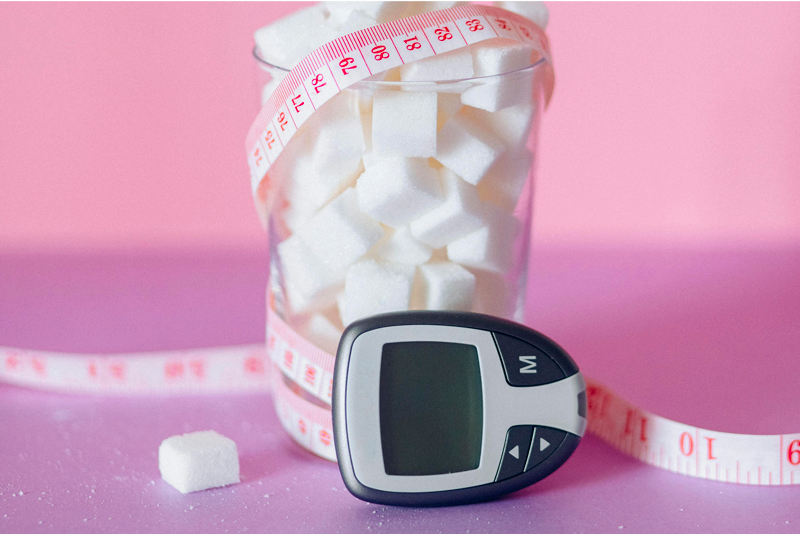
Ramadan is observed by Muslims worldwide. It is a period of fasting and changes in eating habits, which are not without risk for people with prediabetes.
A reminder about the diagnosis of prediabetes
Patients with symptoms that may be related to abnormal blood glucose levels are often diagnosed with prediabetes. These patients have warning signs that suggest that their body is experiencing impaired glucose tolerance.
Symptoms that may lead to a diagnosis by blood test usually include the following :
- Consistent, higher than average thirst.
- Abnormally frequent urination.
- Abnormal fatigue.
- Dizziness.
- Tingling in the hands or feet.
The cause of these ailments can be directly related to abnormal blood sugar levels, according to Jill Weisenberger, MSc, registered dietitian, certified diabetes educator and author of “Prediabetes: A Complete Guide”. She explains that if the patient’s blood sugar (glucose) level is higher than the normal average, then the body will try to pass the excess through the urine. This may also explain why these individuals experience consistent thirst. Similarly, hyperglycemia can lead to damage to the nerve fibers in the body’s extremities, which explains the numbness or painful tingling sensations in the hands and feet.
It is therefore necessary for patients with such discomfort to consult a doctor as soon as possible in order to obtain a medical prescription to analyze their blood sugar level. At this point, we should note that an abnormally high level of sugar or glucose in the blood is only a consequence of insulin resistance in the body. It should also be remembered that insulin is a hormone, originating from the pancreas, which enables the body to create energy from glucose. When this insulin is not properly used by the body, the sugar in the blood increases because it can no longer be used as it should be: it therefore accumulates until the patient starts feeling the first signs of prediabetes.
Scientists now consider that prediabetes is defined as a blood sugar level between the recommended normal values (between 0.70g/l and 1.10g/l in the fasting state) and the threshold for type 2 diabetes (above 1.26 g/l in the fasting state). Furthermore, the American Diabetes Association considers that the glycated hemoglobin level – also called “HbA1c” – should be monitored as well to determine whether the patient is prediabetic. According to their criteria, a prediabetic person would have a glycated hemoglobin level of between 5.7 and 6.4%. For a better understanding of these data, it should be noted that this is a blood glucose test carried out on the patient over several months, in order to obtain an overall view of their blood glucose situation.
Prediabetics should not be medicated; instead, they are strongly encouraged to monitor their blood sugar levels regularly and to adopt a healthier lifestyle. A more balanced diet, gentle but regular exercise and avoiding refined sugars are therefore strongly recommended, as they are pre-determinants in delaying the onset of type 2 diabetes.
Eating and fasting during Ramadan
Ramadan is a Muslim tradition observed by millions of believers around the world. It is a period of abstinence in all respects, coupled with a strengthening of positive thoughts.
This abstinence is largely represented by the meal times, which drastically change: no food or water is allowed from sunrise to sunset. The three daily meals are divided into breakfast (Suhur), which takes place before sunrise, lunch (Iftar), which is after sunset and corresponds to the moment of breaking the fast, and finally dinner (Isha), which corresponds to the last meal before the practitioners go to bed.
This means that people practicing Ramadan fast throughout the day: the meals following this abstinence are often high in calories and usually consist of high glycemic index foods. Conversely, the meals eaten are often low in fiber and vitamins. The spirit of conviviality and the restriction during the day thus encourage a high food intake at the permitted time of meals, which can have significant consequences on the health of people with prediabetes. Indeed, the practice of Ramadan leads to a significant and sudden change in the lifestyle of individuals, whose body is subjected to significant dehydration during the day. According to the website www.diabète.fr, and its information booklet “Diabetes and Ramadan”, this period of fasting leads to hormonal and metabolic disturbances in the body, which can cause complications in people with prediabetes.
On the other hand, people with established diabetes, type 1 or 2, are normally considered “at risk” and are usually exempt from Ramadan because of their condition. However, many diabetics and prediabetics choose to fast anyway, and it is essential for their health to follow a few rules which we will detail below.
What to be careful about
Before going into detail about the dietary recommendations made by health professionals, it is important to specify the cases in which breaking the fast is essential. Of course, the patient is urged to consult their doctor or a specialist in diabetes before even beginning the Ramadan fast, in order to ensure that this religious practice does not represent any immediate risk to their health. The presence of cardiac problems, renal insufficiency or comorbidities puts the patient at high risk, according to the Diabète.fr website, which makes it impossible to fast during the month of Ramadan.
Also, the patient must carefully monitor their blood sugar level at several times during the day: as previously mentioned, a sudden change in eating habits could trigger hypoglycemia or hyperglycemia, which are highly detrimental to the body’s health. Therefore, when the patient’s blood sugar level is measured below 0.6 g/l and above 3g/l, it is essential to break the fast immediately. According to Professor Hassan El Ghomari, a diabetologist endocrinologist at the University Teaching Hospital (CHU) Ibn Rochd in Casablanca, in an interview with the newspaper “L’Opinion”: “Hypoglycemia can be fatal in certain cases, as the drop in glucose in the blood causes neuronal cells to suffer.”
The warning signs of hypoglycemia must be clearly and quickly identified by patients so that they can stop fasting in time. The following symptoms should therefore be given special attention :
- Cold sweats;
- A strong feeling of hunger;
- Severe headaches;
- Shivering;
- Abnormal fatigue.
Recommendations of medical professionals for the practice of Ramadan with prediabetes
In order to prevent the Ramadan period from worsening the health condition of individuals with prediabetes, several recommendations should be followed. It is important to remember that under no circumstances should a patient fast during Ramadan against medical advice.
In his book “The pleasure of sugar at the risk of prediabetes”, Dr Réginald Allouche gives several recommendations for prediabetics, which should be followed scrupulously during Ramadan. He recommends a sufficient protein intake of 1 gram of protein per kilo per day. He also strongly recommends that omega-3 fatty acids (fish or rapeseed oil) and omega-9 fatty acids (olive oil) be preferred, avoiding omega-6 fatty acids such as sunflower or corn oil as much as possible. In addition, the consumption of fiber fiber, through legumes and vegetables, should be predominant in meals.
Dr. Nabil Assad, endocrinologist and diabetologist, in an interview with RFI radio, provides some useful information for prediabetic patients wishing to preserve their health during Ramadan. Dr Assad specifies that these individuals should avoid limiting themselves to a single meal per day, which can be a real glycemic bomb for the body.
On the contrary, he recommends a breakfast consisting of ingredients with a low glycemic index, such as rice or wholemeal bread. A meal consisting of soup and a little starch can be eaten to break the fast. The last meal should consist mainly of fiber-rich foods with a moderate glycemic index.
In conclusion, we cannot stress strongly enough that patients with prediabetes should seek specialist medical advice before undertaking the Ramadan fast. In collaboration with a health care practitioner, a diet plan can be devised that is adapted to the individual’s glycemic and general medical situation so that fasting can be carried out safely.
Our latest publications
Want to learn more about topics related to blood sugar management?
Here are our most recent blog posts!



